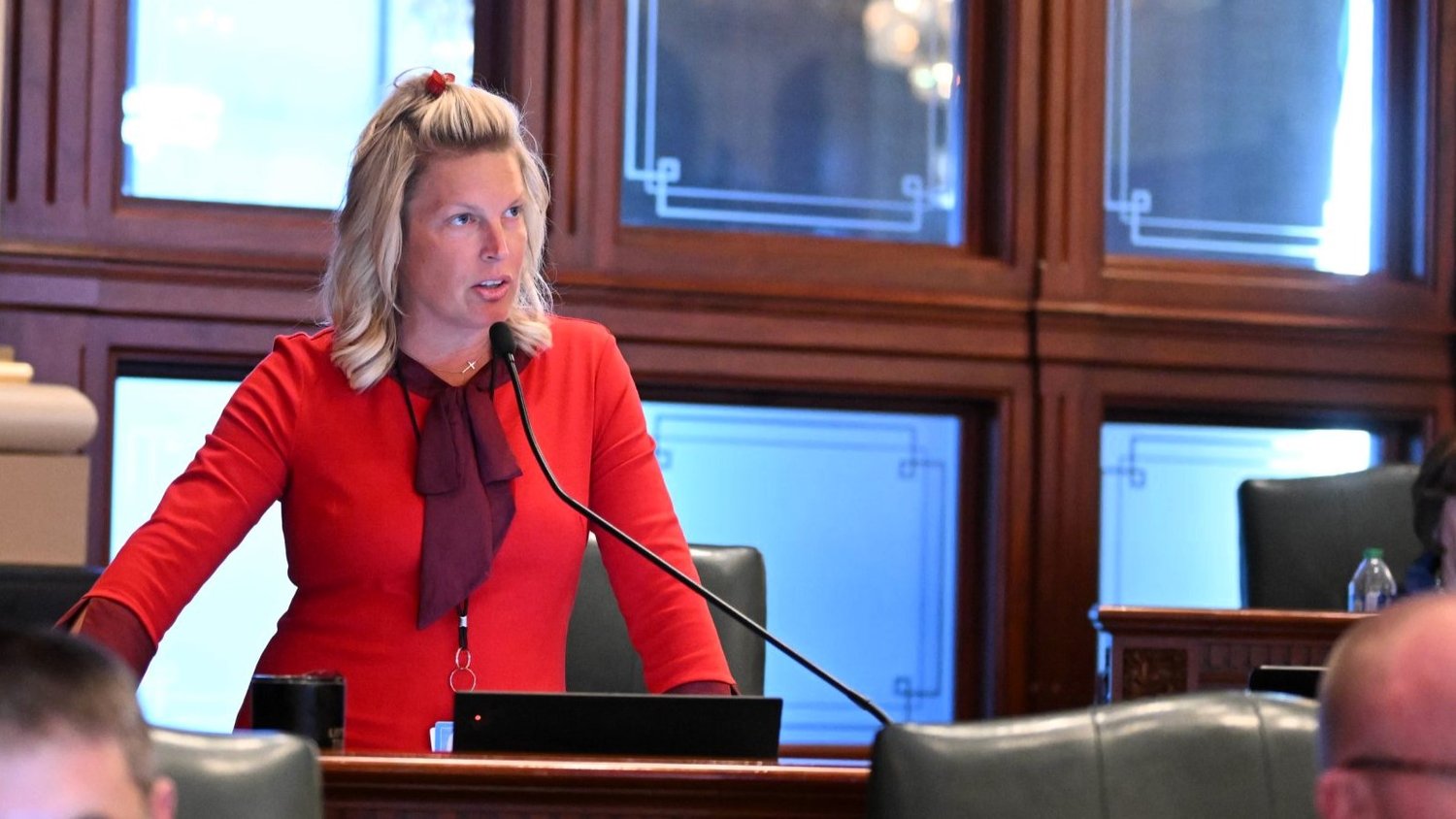The Senate Executive Committee held a subject matter hearing Wednesday on state Sen. Sue Rezin’s legislation, she said will improve accessibility and inclusivity for individuals with disabilities and their caregivers in public spaces.
 image/jpeg NQ56WFBMZRG27MTCTMBDNMLY6M504227-150x150.jpg
image/jpeg NQ56WFBMZRG27MTCTMBDNMLY6M504227-150x150.jpg
 image/jpeg 5.10 mccombie.jpg?format=1500w
image/jpeg 5.10 mccombie.jpg?format=1500w
 image/jpeg 6641c2dea6960.image.jpg?resize=300,305
image/jpeg 6641c2dea6960.image.jpg?resize=300,305
 image/jpeg ctc-l-nyu-protest_187858917.jpg?w=640
image/jpeg ctc-l-nyu-protest_187858917.jpg?w=640Springfield, IL (WTAX) – A billboard along Interstate 55 in Springfield is part of a campaign to recruit police officers to Nashville.
“One of the officers we had that came to our last class said there was a lot of interest from Illinois, back home,” said Capt. Michael Vaughn, who oversees recruiting for the Metropolitan Nashville Police Department. “With us casting a broad net out there, Illinois is just one of the states we’ve chosen to see what interest is there to come to Nashville to be police officers.”
Vaughn said the current employment environment is one in which recruiting for virtually all fields is difficult. Springfield leaders know that, having recently increased police salaries.
“I snicker just a little bit,” Springfield chief Ken Scarlette said, “because I have been talking with my staff about – I don’t use the word retaliate – but what we may do to advertise in the Nashville area.”
Vaughn said an officer with two years’ experience on another force will make $70,000 in Nashville, plus a three percent bump for an associate’s degree and six percent for a bachelor’s degree.
Scarlette said an SPD officer with three years’ experience elsewhere will make $95,000, plus a $5,000 relocation bonus.
The post Police recruiting war? first appeared on WTAX 93.9FM/1240AM.

.
By Ray Hanania
.
Sports has really changed over the past few generations. When I was young, going to a baseball or football game was very affordable.
That’s because the sports teams weren’t paying the outrageous contracts to get the best sports stars.
Sports competition used to be in person. We would go to the game and watch it. These days, athletes and sports organizations get a lot of money from lucrative advertising deals in the millions.
A hot dog at Wrigley Field to watch the Cubs play costs $8. In fact, the last time I went to a game with my daughter and cousins, six people, it cost over $450 for food, parking and drinks.

Ray Hanania
You can imagine I don’t go to the live games that often any more. But, I always enjoy the fact that they have preserved Wrigley Field. It reminds me of when I would go there as a child with my father in the 1960s.
We would also go to a few Bears games at Soldier Field. The stadium has been a magnet for families and sports fans since 1924 and home to the Bears since 1971. It was renovated in 2023, and guess who paid for most of it? You bet. The taxpayers. The renovation was $632 million. Taxpayers covered $432 million.
The Bears want to build a new stadium; but honestly, I love looking at and going to the existing stadium, even with the expansion back in 2003 that makes it look like a space ship. (Hey, I’m a 1950s Baby Boomer who grew up with science fiction and sports, by the way.)
After flirting several years with Arlington Heights, where the Bears own 326 acres of land, the Bears returned to Chicago proposing a multi-billion domed stadium.
The Illinois Sports Facilities Authority is currently using a 2% tax on hotel stays to pay off outstanding debts.
I like Mayor Brandon Johnson, who is exploring ways to revive Chicago as a tourist attraction. Rising crime in Chicago that is spreading to the suburbs is making that difficult, but he seems to be doing it the right way. A new stadium, he says, will attract tourists from “outside of Chicago” — mostly white suburbanites — and will rely on them paying some of the costs.
But how much are we talking about? No one in government has any respect for the taxpayers.
But professional sports has huge respect for their athletes who receive outrageous contracts in the tens of millions. In fact, tens of millions doesn’t even come close.
Here are the wages of some Major League Baseball players, according to Sportrac: Shohei Ohtani, Los Angeles Dodgers, $70 million; Max Scherzer, Texas Rangers, $43,333,333; Justin Verlander, Houston Astros, $43,333,333; Zach Wheeler, Philadelphia Phillies, $42 million; Aaron Judge, New York Yankees, $40 million; Jacob deGrom, Texas Rangers, $37 million; Gerrit Cole, New York Yankees, $36 million; and Mike Trout, Los Angeles Angels, $35,541,667.
The contracts are outrageous and similar to contracts in the NFL.
Sports used to be fun. Players could make money. But these days, they are being paid way too much.
Of course, sports players are not the only ones ripping off the public. Officers at the ASPCA are also ripping off the public. You know that organization that puts sad-looking dog faces on TV, begging you to send them $19 a month.
Executives at ASPCA are paid more than $5.5 million in salaries and receive $4.8 million in pension benefits. I’ll write about them next.
Ray Hanania is a former Chicago City Hall reporter and award-winning columnist. Visit hanania.com for more opinion.
This post was contributed by a community member. The views expressed here are the author's own.

AURORA -- For bilingual communities like Aurora, Illinois' teacher shortage takes on special significance.
Leaders with the Latino Policy Forum discuss their work in this op-ed to address bilingual teacher shortages, as an outgrowth of the recent Illinois Association of Regional Superintendents of Schools (IARSS) shortage survey:
Illinois faces a critical shortage of teachers equipped to work with English Learners. According to the 2023-2024 educator shortage report, Bilingual/ESL and Bilingual Special Education teachers all had vacancy rates above the state average. Indeed, over 420 positions were unfilled, with 230 filled by other means such as hiring substitutes or retired teachers and increasing class sizes.
The shortage of bilingual/ESL teachers is a problem, both for students and our state. Bilingual/ESL educators attain additional credentials that enable them to support English Learners (ELs), students in PreK-12th grade whose first language is not English and who require additional programming to develop academic English facilitating their full participation in school. Without these educators, research shows that English Learners will struggle to develop academic English and have difficulty engaging productively in reading, mathematics, science, and all other school subjects.
Illinois must do more to attract and retain these teachers as the number of English Learners is on the rise. From SY2010-11 to SY2023-24, the EL population in Illinois grew from 156,888 to over 271,000. This number will continue to rise due to the growing number of newcomer students and as Illinois increases access to preschool. The bilingual/ESL teacher shortage disproportionately affects Spanish-speaking Latino students, but also impacts students from diverse linguistic backgrounds.
We echo the recommendations made in the report and would like to highlight some here:
- Recruit individuals earlier: Educators Rising offers a model and curriculum for recruiting high school students into the teaching profession. High school students on the path toward the Seal of Biliteracy represent potential candidates and would ease the gap for bilingual educators as they have earned recognition for exhibiting college readiness in both English and a foreign language.
- Train paraprofessionals and teacher assistants: School-based classroom staff are an invaluable resource. They often mirror the linguistic diversity among students, with one in five paraprofessionals speaking a language other than English. Illinois should support them to stay in their jobs while earning their license in a high-need subject, including offering tuition support.
- Recruit and support career-changers: Community members who are bilingual and possess bachelor’s degrees in non-teaching fields can be recruited and supported to earn a provisional license, enabling them to start teaching while working towards full teacher licensure.
- Increase salaries for educators who teach ELs and special education students, not simply for attaining a credential. Illinois has many bilingual/ESL and special education teachers who are no longer in front of English Learners and students with disabilities.
- Increase scholarships for educators, especially for those entering high-need areas.
We offer additional recommendations:
- Allow individuals to share a job, beginning in 4th or 5th grade when classes can be departmentalized by subject area.
These investments are critical as access to qualified bilingual/ESL educators is the most significant in-school factor for English Learner achievement. These educators believe that students’ home language is an advantage and use theoretical knowledge and specific strategies to ensure students develop the knowledge and skills needed to engage in their learning.
Addressing the bilingual teacher shortage is an investment in our state’s future. We must prepare English Learners to excel academically and contribute fully to our diverse society.
Dr. Rebecca Vonderlack-Navarro from the Latino Policy Forum
Dr. Gudelia Lopez from Lopez Strategic Solutions
The views expressed in this post are the author's own. Want to post on Patch?
Posted Friday, May 3, 2024 11:00 am
Dr. Kimberly Chambers
I have been fortunate to spend 22 years in the school human resources role. More recently, I have also been working as the executive director of the Illinois Association of School Personnel Administrators (IASPA) representing more than 560 educational human resources professionals in Illinois. We are here to tell you: The teacher shortage is real.
At the start of my career, it was so easy to find teachers in some areas (looking at you, high school English and PE) that filling vacancies was not a worry. The landscape has completely changed. Join any group of educational human resources folks, and you will hear us worrying about staffing shortages. We search high and low to find qualified candidates for all our positions – traveling to job fairs and posting our jobs on sites far and wide. While some districts are struggling to find a single, great candidate for a position, other districts are forced to go without. Whether it is an elementary art position or a high school science position, there are classrooms in Illinois where students do not have the benefit of a qualified teacher … all year long.
The statistics are alarming. According to the National Center for Education Statistics, 53% of public schools reported being understaffed entering the 2022-23 school year. Nearly 20% of teachers leave their positions within the first three years, and approximately 40-50% leave within the first five years (NCES). This turnover not only disrupts continuity in classrooms but also places a significant strain on school resources as we continue to invest in recruitment and retention of new talent.
Furthermore, we know the pandemic exacerbated this issue. The challenges of remote learning, concerns about health and safety, and the overall stress of the past couple of years have driven even more teachers out of the profession. How could this not impact students’ decision to go into the field of education? It’s no wonder that enrollment in teacher preparation programs has been declining steadily, indicating a shrinking pipeline of new educators entering the field.
As educational leaders, it is our responsibility to address these systemic issues and create an environment where teachers feel respected, valued, and adequately compensated for their contributions. This requires a multi-faceted approach that encompasses policy reforms, increased investment in education, and innovative strategies to attract and retain educators.
This year’s Illinois Association of Regional Superintendents of Schools (IARSS) survey on the teacher shortage indicates that while schools are making encouraging progress in filling classrooms, more work needs to be done.
IASPA is working hard to be part of the solution.
We routinely offer professional learning to help combat the teacher shortage. This year’s annual conference in January included six breakout sessions related to hiring, retention, the educator pipeline, student teachers, and creating pathways to teaching.
Our April 26 online Administrator Academy, Managing Bias In Hiring-Inclusive Hiring Practices, aims to ensure that hiring administrators are trained to manage a fair and equitable hiring process.
Since 2022, IASPA has hosted the Illinois Virtual Educator Job Fair, an opportunity for school districts and candidates to connect in a synchronous, online fashion without needing to be out of the office or incur the expenses of travel. Our March 6, 2024, job fair included more than 1,200 candidates! The next is scheduled for June 6, 2024.
The teacher shortage is a complex issue that requires a concerted effort from all stakeholders. By investing in our teachers and administrators, supporting their professional growth, and advocating for policy reforms, we can build a stronger future for all kids in Illinois.
Dr. Kimberly Chambers serves as executive director of IASPA and is director of human resources at Adlai E. Stevenson High School District 125 in Lincolnshire.
